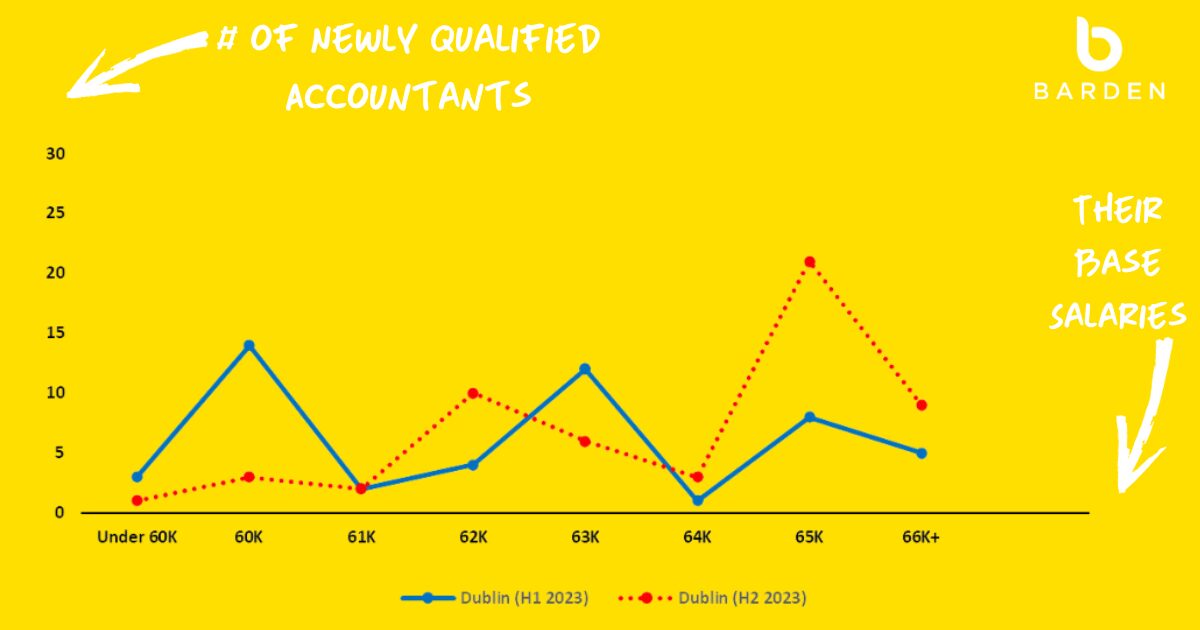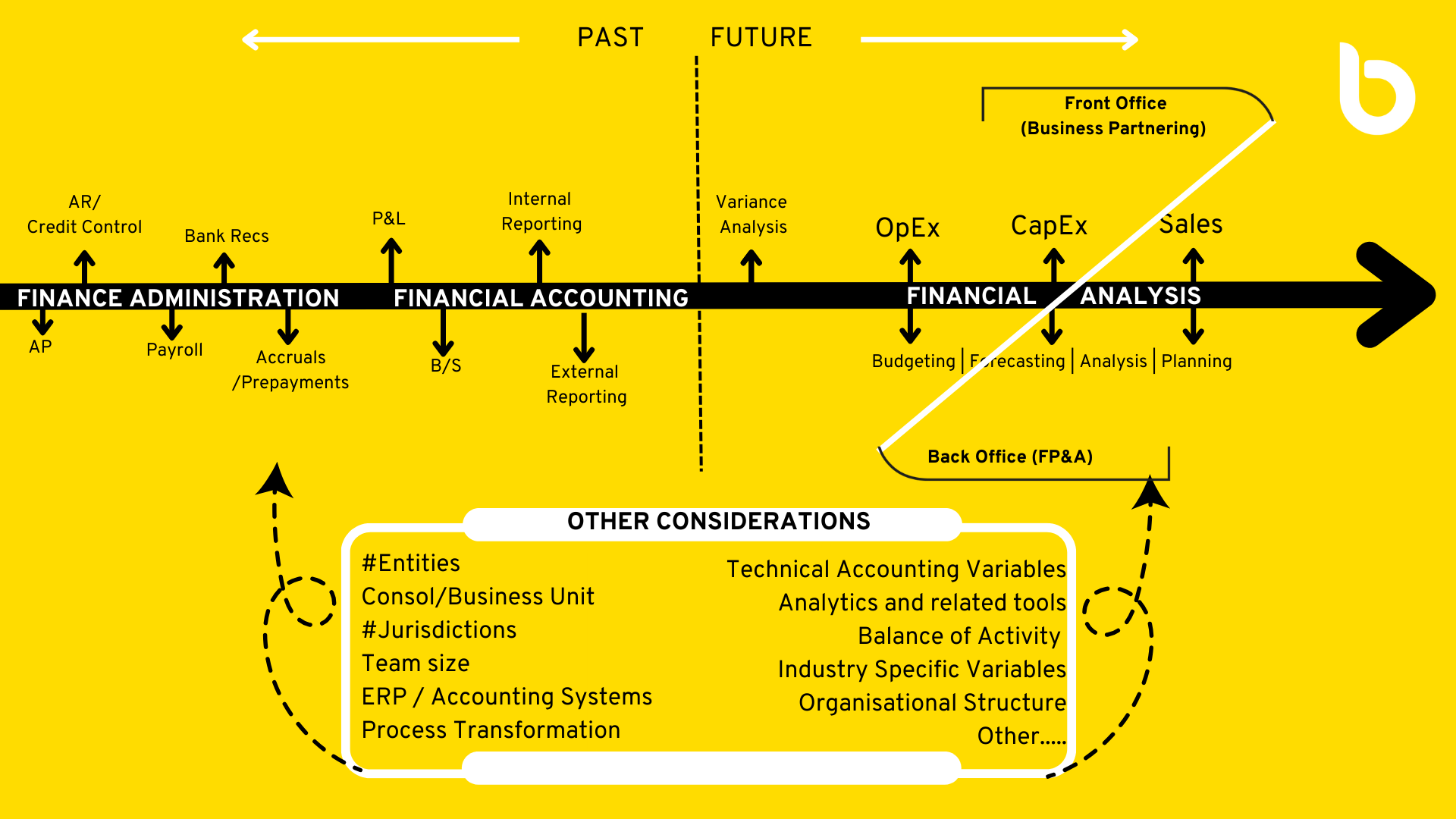If you’re hiring a newly qualified accountant this quarter, here are some things you need to know…
While 100s of newly qualified accountants enter the job market every year (typically around May and October each year) demand for top accounting talent is always high, with Ireland’s top finance teams competing intensely for the best of the best. Before you think about trying to attract newly qualified accounting talent to your team it’s important to get a real-time snapshot of the driving forces in the market and how you could position yourself as an employer of choice. That’s where Barden comes in.
#1 Base
For newly qualified accounting talent it can be all about the base, so let’s talk reward first. Here is some data on salaries out there at the moment in Dublin.

Interesting, right? There are a couple of things that really stand out for us in the above; namely:
- The median salary in H2 last year was 65K, up from 63K in H1, with the average coming in at €64,482, up from €62,964 in H1 2023. This is a material shift in both median and base salary but it represents a slowdown on some of the more dramatic shifts we have seen in through 2021 to 2022. It would appear that the market might be beginning to level off when it comes to base salaries for newly qualified accountants.
- Worth noting is that salaries for Group accountant-type roles in Plc teams appear to have leveled off at €65K during 2023, suggesting that salaries may have already peaked in this area.
- We have seen evidence of base salaries in some companies going as high as 70K but these are very much outliers and only seen in larger lessor environments, high-octane investment analyst roles, and with specific companies where the niche experience brings a premium.
*these are Dublin-only numbers. For outside Dublin, you would typically apply a 10% reduction on base +/- 2.5 % depending on location. For bespoke advice on salaries in your location contact one of our expert team in a Barden office near you.
#2 Continuum of Activity
This is important. But a little tricky. Below is a simple continuum of the activity you will expect to see in any finance team/role. It ignores things like finance transformation, stat reporting, and tax…let’s keep it simple for now.
Two companies can be looking to hire a financial accountant, but the nature of their roles can be very, very different. What % of the person’s time is spent on what activity will matter to talent. Broadly speaking newly qualified accountants end up in:
- Financial Accounting roles 75% of the time (the balance of activity in these roles will matter. Larger companies often come with more specialised roles. There are lots of rules of thumb like this. We can talk about them when we meet).
- Financial Analysis roles 10% of the time (very hard to get straight out of contract).
- Internal Audit roles 5% of the time (an excellent route often overlooked).
- Other roles 10% of the time (the ones we’re not talking about here).
Below is a visual representation of the activity in a basic finance team along with some of the variables that come with the context of the role. The % of time your hire will spend either side of the line below, along with the variables in their client/company experience compared to your company/needs, are critical considerations for you and your HR team.

What to learn more about applying these concepts to make sure your role is fit for market and you attract the right talent for the right role at the right time? Simple. Drop our Talent Advisors a line and they will help you bespoke these concepts to your unique needs.
#3 Demand vs Supply
This is a tricky thing to quantify given 1) the transient nature of this talent pool (only newly qualified once) and 2) the fact that supply peaks at particular times of the year as people exit training contracts. Exact data points on the number of people available are not possible to gather in any meaningful way over a particular quarter and can be highly time-sensitive. As opposed to referencing data we cannot stand over, we thought it better to flag a few things:
- If you want to have the best access to talent, timing is everything – sync your search in line with training contracts ending then you’ll have options; do the opposite, and you’ll experience the opposite.
- If you are searching for talent in sync with the market then you can be more specific in terms of the exact client/industry experience you would like. Search for talent out of sync then you may need to be more open-minded in terms of training experience to get good people into your process (FS trained being an option for an Industry role for example).
- With competition high and talent market aware, many newly qualified accountants will look to secure a job offer months ahead of their contract completion date. Keep this in mind when it comes to considering timing.
- Make sure you are clear in articulating the context of your role and the purpose behind your organisation. Talent these days look to people, role and purpose in that order, so make sure you are very clear on those points when you craft a job description and articulate your opportunity externally.
#4 What are companies doing to attract Newly Qualified talent these days?
The CFOs that we work with use some of the following tactics to make sure they get the best results:
- Clear articulation of the people, role and purpose (as above) – if you want to compete for the best you need to compete like the best.
- Competitive base salaries – money is often a hygiene factor – its presence does not necessarily motivate but its absence most certainly demotivates. Price your role right to the quality of talent you are looking to attract.
- Additional benefits – it is not all about the base and making sure you have sense-checked the averages out there for bonus, pension, and similar before you go to market is key.
- Considered Hybrid working patterns that reflect the nature of the role – hybrid working has over the years has also become a hygiene factor – no flexibility to work from home is a significant detractor and will limit greatly your access to talent.
- Pathways for development internally are key – ambitious people have ambition so make explicit the opportunity to grow in the role and how the team/company will support professional development.
There are lots of other tactics companies use to engage and attract newly qualified accounting talent; Curious? Get in touch.
In Barden, we understand that each team, role, and requirement is unique. If you would like to discuss what tactics and approaches would suit you, contact our Newly Qualified Team in Barden, Leinster – Brian O’Connor (brian.oconnor@barden.ie), Munster – Marissa Maher (marissa.maher@barden.ie); we’re where leaders go before, they start hiring Newly Qualified talent.
This information is accurate as per February 2024 and will be updated periodically. Data sources include Barden Proprietary Data, LinkedIn Analytics, and other proprietary 3rd party data sources. If you have a request and would like real-time information to inform your hiring decisions contact Brian O’Connor at brian.oconnor@barden.ie or Marissa Maher (Munster) at marissa.maher@barden.ie


 Jump Back
Jump Back

